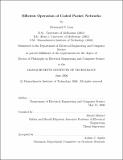Efficient operation of coded packet networks
Author(s)
Lun, Desmond S. (Desmond Siu Men), 1979-
DownloadFull printable version (702.9Kb)
Other Contributors
Massachusetts Institute of Technology. Dept. of Electrical Engineering and Computer Science.
Advisor
Muriel Médard.
Terms of use
Metadata
Show full item recordAbstract
A fundamental problem faced in the design of almost all packet networks is that of efficient operation -- of reliably communicating given messages among nodes at minimum cost in resource usage. We present a solution to the efficient operation problem for coded packet networks, i.e., packet networks where the contents of outgoing packets are arbitrary, causal functions of the contents of received packets. Such networks are in contrast to conventional, routed packet networks, where outgoing packets are restricted to being copies of received packets and where reliability is provided by the use of retransmissions. This thesis introduces four considerations to coded packet networks: 1. efficiency, 2. the lack of synchronization in packet networks, 3. the possibility of broadcast links, and 4. packet loss. We take these considerations and give a prescription for operation that is novel and general, yet simple, useful, and extensible. We separate the efficient operation problem into two smaller problems, which we call network coding -- the problem of deciding what coding operation each node should perform given the rates at which packets are injected on each link -- and subgraph selection -- the problem of deciding those rates. (cont.) Our main contribution for the network coding problem is to give a scheme that achieves the maximum rate of a multicast connection under the given injection rates. As a consequence, the separation of network coding and subgraph selection results in no loss of optimality provided that we are constrained to only coding packets within a single connection. Our main contribution for the subgraph selection problem is to give distributed algorithms that optimally solve the single-connection problem under certain assumptions. Since the scheme we propose for network coding can easily be implemented in a distributed manner, we obtain, by combining the solutions for each of the smaller problems, a distributed approach to the efficient operation problem. We assess the performance of our solution for three problems: minimum-transmission wireless unicast, minimum-weight wireline multicast, and minimum-energy wireless multicast. We find that our solution has the potential to offer significant efficiency improvements over existing techniques in routed packet networks, particularly for multi-hop wireless networks.
Description
Thesis (Ph. D.)--Massachusetts Institute of Technology, Dept. of Electrical Engineering and Computer Science, 2006. This electronic version was submitted by the student author. The certified thesis is available in the Institute Archives and Special Collections. Includes bibliographical references (p. [109]-122).
Date issued
2006Department
Massachusetts Institute of Technology. Department of Electrical Engineering and Computer SciencePublisher
Massachusetts Institute of Technology
Keywords
Electrical Engineering and Computer Science.